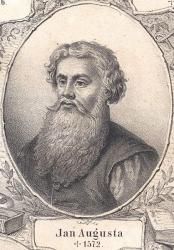
1500 - 1572 Person Name: Bishop Johann Augusta, 1500-1572 Author of "How blest and lovely thy earthly dwellings" in Hymnal and Liturgies of the Moravian Church Augusta, Johann, seems to have been born at Prag about the year 1500. He was consecrated Bishop of the Bohemian Brethren in 1532, became president of their "select council" in 1537, and died at Jung-Bunzlau, Bohemia, Jan. 13, 1572. Two of his hymns, written in Bohemian, have passed into English through the German as follows:—
i. Aj jak jsou milí tvoji příbytkove. [The Christian Church.] Founded on Ps. lxxxiv. In the Bohemian Brethren's Hymn Book, 1559, f. 166, in 18 stanzas. Translated into German by J. Geletzky in the Kirchengeseng , Prag, 1566, and thence in Wackernagel, iv. p. 355, beginning “0 wie sehr lieblich sind all dein Wohnung." Translated from the German by J. Gambold as No. 269 in pt. i. of the Moravian Hymn Book, 1754 (1849, No. 763), beginning, "How amiable Thy habitations are."
ii. Budiž veleben Pán Bůh náš pochválen. [The Christian Church.] Founded on Ps. xlviii. In the Bohemian Brethren's Hymn Book, 1561. f. 168, in 8 stanzas. Translated into German by P. Herbert in the Kirchengeseng, 1566, and thence in Wackernagel, iv. p. 420, beginning, “Gott woll'n wir loben." The translations from the German are (1) “Praise our God gracious,” by J. Gambold, as No. 268 in pt. 1 of the Moravian Hymn Book , 1754. (2) “Praise God for ever,” as No. 491 in the Moravian Hymn Book, 1789 (1849, No. 761). [Rev. James Mearns, M.A.]
-- John Julian, Dictionary of Hymnology (1907)
Jan Augusta


 My Starred Hymns
My Starred Hymns



